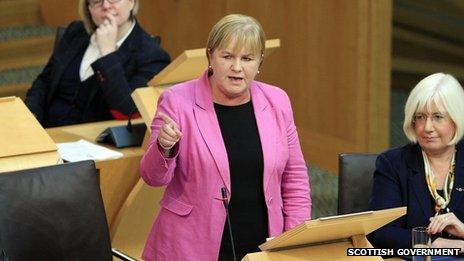Historic moment not idle wind
- Published

Alex Salmond introduced a referendum bill among his new legislative programme
Day One of the new parliamentary term at Holyrood.
A chance for the lieges to survey the modest, replacement Holyrood hostelry - already nicknamed Margo's Bar in honour of the independent member from Lothian.
Opinion is divided upon that topic (the boozer, that is, not Margo) with sporadic muttering from disgruntled media members at the opening hours of the new facility in Queensberry House.
Anything else dividing opinion? Not much really. Just the small matter of the dissolution of the Parliamentary Union of 1707.
We have been debating that particular topic so long and so earnestly that there is a danger of historic moments passing us by like the idle wind which we regard not. Today was such an historic moment.
Alex Salmond has the mandate and the parliamentary votes to introduce a bill paving the way to an independence referendum in 2014. And today he confirmed he intends to do just that.
Labour's Johann Lamont suggested that Mr Salmond's heart was not truly in the project, that he fears defeat - and consequently is placing repeated obstacles in the path of a simple Yes/No vote.

Labour's Johann Lamont suggested that Mr Salmond's heart was not truly in the project
I think it more likely that Mr Salmond is trying to divide his Unionist opponents, trying to align himself with inchoate public opinion and trying to reach out to those who favour greater devolved powers (even if such an option does not ultimately feature on the final ballot paper).
The most likely option, I believe - although it is far from fixed - is that there will be a Yes/No plebiscite with Alex Salmond blaming his political opponents for the absence of a wider choice and urging support for independence as a consequence.
However, today's Holyrood exchange spotlighted another issue: the impact of the economy on the referendum and the concomitant challenge for the largest parties.
Alex Salmond has long believed that Scotland will be most inclined to go for independence when Scots feel relatively confident about themselves and their prospects: that they will, in short, seek full autonomy as a demonstration of self-will, not in flight from London or perceived decay in the Union.
The present economic circumstances, it might be argued, are not entirely propitious to such an approach. Indeed, senior Nationalists say they are encountering signs of an early mood of disquiet on the doorsteps - not hostile to independence but sceptical about such a move in the current climate.
Political colour
Therein lies Mr Salmond's problem. And so he sought to turn it round today by seeking to bolster confidence based upon the record of his government and devolution more generally. He went further, seeking to contrast this record with the position south of the border.
Scotland, he argued, was performing better in the NHS, in police numbers, in student provision - and on the key workforce indicators. Why, in those circumstances, was it not sensible to trust Scotland's elected Parliament with the full powers to address the economy?
Similarly, though, Ms Lamont faces a potential weakness in her pitch, albeit perhaps a more subtle one. She accused Mr Salmond of failing to use existing powers to their full effect. He was, she said, a first minister who "glories in his own powerlessness" rather than act.
The problem, she further invited us to infer, was not the existence of a UK government but its political colour.
Wherein lies the inherent challenge to Ms Lamont - which we can expect Nationalists to pose. It is this. Does she prefer a continued UK Conservative-led government to an independent Scottish one led by the Nationalists? Or indeed led by Labour?
Each leader, of course, has answers. Ms Lamont argues that the wider polity and economy of the UK offer a greater platform for apportioning social equity. Mr Salmond argues that independence would allow the deployment of economic policies specifically designed for Scotland's needs.
More to come. Much, much more.